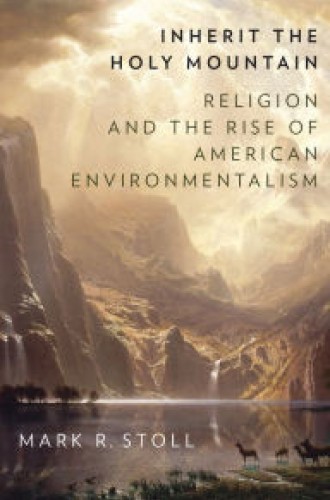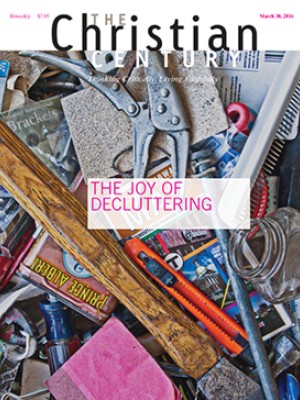Calvinists and eco-justice
In an oft-told version of the story, Christianity is given much of the blame for our current environmental crisis. The belief in a transcendent creator God, together with the theological claim that we are created in God’s image, we are told, has led to a culture of mastery and dominance. We imagine that we, like God, can transcend nature, often with blithely destructive effect. Because of this, Christianity—and religion more generally—is often left out of histories of the American environmental movement. To many, Christianity has destroyed our world, and it certainly can’t help us save it.
The wonderfully rich new study Inherit the Holy Mountain: Religion and the Rise of American Environmentalism, by Mark Stoll, who teaches history at Texas Tech University, attempts to complicate this story. Although we may want to question some of Stoll’s conclusions, his book might prove to be necessary for finding a religious way into a sustainable future.
Read our latest issue or browse back issues.
Stoll tells a story of Reformed Christianity in America that is inspired by his discovery of a shocking piece of empirical evidence: in what Stoll calls its “glory days” (from 1910 to 1920), nearly all the leaders of the American conservation movement were lapsed Presbyterians, and when that era of conservation gave way to the contemporary environmental movement, it was again lapsed Presbyterians leading the way. Inherit the Holy Mountain provides a historical narrative to explain the importance of these lapsed Presbyterians.
In its barest outlines the narrative Stoll offers is quite straightforward. It is the story of two theological desires: first, John Calvin’s love of nature and his longing to hear God’s voice in nature, and second, the twinned duties of improvement and stewardship in the development of Calvinist thought and practice. It is also, though, a more complex tale about the unfolding of Reformed social and cultural life, about how Presbyterians took up a set of beliefs for living with nature that had been formulated by Puritans and early Congregationalists in New England towns, and about how, with an Emersonian twist, these beliefs were put into national practice as Progressive Era conservationism and modern environmentalism. Throughout, Stoll is interested in more than just theologians; he is also interested in artists and writers, activists and government officials, architects and city planners. Inherit the Holy Mountain is a full-bodied social history of Reformed American environmentalism.
Weighing in at just over 400 pages, the book is not an easy work to summarize. But we can begin with Stoll’s helpful reminder that John Calvin loved nature. For a fallen humanity that could no longer trust its own speculations, nature became, along with the Bible, a way to encounter the power and glory of God uncorrupted by human sin. As Stoll demonstrates, Calvinists and Reformed folk in America embraced and developed Calvin’s love of nature in a number of ways, from seeking God’s voice in solitary sojourns in nature to developing a strong tradition of natural history and science as contemplation of God’s work. Puritans and early Congregationalists were often in awe of the American wilderness.
If these early American Calvinists were animated by a love of nature, they were equally driven by a duty to improve it and exercise good stewardship over it. The parable of the steward in Luke 16 and the parable of the talents in Matthew 25 were always favorites. The great danger of improvement, in both theory and practice, has always been avarice, that greatest of Reformed sins. Improvement and stewardship were therefore taken together as a moral imperative guided by a divine good rather than the human goods of efficiency and profit. Puritans arriving in America often imagined and hoped that improvement and stewardship would lead to the creation of new Edens, of places where culture and the natural world worked in harmony for the glory of God.
Stoll finds an explicit presentation of these two desires, for nature and for improvement and stewardship, in Thomas Cole’s 1836 painting View from Mount Holyoke, Northampton, Massachusetts, after a Thunderstorm—called, more simply, The Oxbow. One of the first great American landscape paintings, The Oxbow is Reformed imagination writ large: the left side of the painting depicts a wilderness ravaged by the passing thunderstorm of the painting’s title, while the right side depicts a New England valley of neatly laid-out farms spreading out from a peaceful river, surrounded by well-managed woodlands. This is a Calvinist American landscape split between the wild power of God and the beauty of a well-planned and realized Eden.
The history of the American environmental movement is, as Stoll presents it, largely the history of the two sides of The Oxbow. The movement was born in a nostalgia for improvement and good stewardship idealized as the New England town. Guided by a faith in agricultural science to improve the land, conservationists attempted to create a new Eden across the militarily expanding western edge of America. They developed policies and practices to manage forests for human use, and they constructed beautiful parks to re-create the glory of God in “natural” wilderness.
As Congregationalism slowly moved away from its Calvinist and Reformed center, Stoll argues, it lost its cultural value and importance to the conservation movement. Newly arrived Scottish Presbyterians would fill the resulting leadership vacuum, animating the duties of improvement and stewardship with a moral fervor inherited from John Knox. If the Puritans and Congregationalists of an earlier era were compelled by duty to improve the world, these new Presbyterians were fired by a moral imperative to eradicate sin and avarice in good Reformed fashion. Out of this newly moralized and fevered desire for improvement and stewardship and for the end of avarice, the Progressive Era was born and the conservation movement achieved its greatest successes.
At nearly the same moment, an Emerson-inspired movement was reaching maturity, drawing Presbyterians out of what they felt was the dogmatism of their religious practice and reminding them of their love of nature. For Stoll, it seems, Emersonian thought was merely an intervention in an otherwise Reformed history of American environmentalism, and it functioned mostly as a reminder of a Calvinist love of nature. In other words, Emerson was simply the path by which Presbyterian conservationists could make their way into the left side of Cole’s painting, into the wilderness of God’s presence, a journey that created modern American environmentalism. Those who made this journey, like John Muir and Ansel Adams, were mostly lapsed Presbyterians animated by a love of nature and a moral imperative to overcome sin and avarice. They were still compelled by a duty for improvement and stewardship, but without the structure of religion.
To this point Inherit the Holy Mountain offers a bewilderingly detailed and nuanced narrative of American environmentalism. But in the 1960s everything changed, and so does Stoll’s narrative. Presbyterians fade from the scene; “Presbyterianism wilts,” Stoll asserts, “and environmentalism droops.” The final few chapters of the book are given over to a cursory study of the outsiders to the Reformed American environmental movement: Baptists, Southern and otherwise, as well as Methodist, Catholic, Jewish, and African-American Baptist environmentalisms. All of this is done within a general sense of decline and failure. Stoll quickly passes over the achievements of these new environmentalists, emphasizing that “they could not fill the place of the morally driven ‘preachers of righteousness’ of Presbyterian upbringing.” Stoll’s concern seems to be that these new environmentalists begin with social justice and not with a felt need to conserve or love nature. For these non-Presbyterians, Stoll worries, social justice only later comes to include environmental justice. Against Stoll, we might say that these non-Presbyterians have developed an ecological sense of justice that goes beyond the provincialism of both conservationism and environmentalism.
For all the possibility and promise that Inherit the Holy Mountain presents, it is not yet clear that the history it offers can also become our ecological future—whether it can meet the challenge of ecological justice without simply dismissing it.







